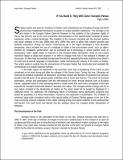Files in this item
If you build it, they will come: Europos Parkas.
Item metadata
| dc.contributor.author | Untiks, Inga. | |
| dc.contributor.editor | University of St Andrews. School of Art History. | |
| dc.date.accessioned | 2008-12-19T13:29:12Z | |
| dc.date.available | 2008-12-19T13:29:12Z | |
| dc.date.issued | 2003 | |
| dc.identifier.citation | Inferno: Journal of Art History Vol. 8 Article 6 2003 | en |
| dc.identifier.issn | 1355-5596 | en |
| dc.identifier.uri | https://hdl.handle.net/10023/617 | |
| dc.description | Previously in the University eprints HAIRST pilot service at http://eprints.st-andrews.ac.uk/archive/00000370/ | en |
| dc.description | Article 6 of 6 in issue devoted to the visual culture of the Scandinavian and Baltic region. | en |
| dc.description.abstract | This article will examine the marriage of art and nature in the Europos Parkas Open-Air Museum on the outskirts of the Lithuanian capital of Vilnius, which has become one of the most successful demonstrations of the transformative potential of artistic experience within a natural landscape. The inception of the museum coincided with the dramatic political and social changes of the late 1980s and early 1990s that were to affect both creative practice and aesthetic experience. During this period, contemporary art in the region developed a more pluralistic perspective, which included the use of a multitude of styles in the post-modern sense, such as object-oriented art, installation, performance, and an increased use of technology in artistic practice, such as photography, video, digital media. In response to this changed artistic atmosphere, many art and cultural institutions began to adapt their program in an effort to engage more fully in the dialogue of Western art discourses. Yet few have successfully transgressed the barriers separating the wider audience from Danto’s art world and its specific language of interpretation, whilst maintaining the integrity of the works on display. This article seeks to explore how the phenomenon of Europos Parkas has constructed and mediated the contemporary at a unique historical moment. | en |
| dc.format.extent | 48019 bytes | |
| dc.format.mimetype | application/pdf | |
| dc.language.iso | en | en |
| dc.publisher | School of Art History, University of St Andrews | en |
| dc.subject | Open-Air Museum | en |
| dc.subject | Lithuania | en |
| dc.subject | Vilnius | en |
| dc.subject | sculpture | en |
| dc.subject | Dennis Oppenheim | en |
| dc.subject | Gintaras Karosas | en |
| dc.subject | Sol Le Witt | en |
| dc.subject | Magdalena Abakanowicz | en |
| dc.subject.lcc | N1.I6 | en |
| dc.title | If you build it, they will come: Europos Parkas. | en |
| dc.type | Journal article | en |
| dc.description.version | https://doi.org/Postprint | en |
| dc.publicationstatus | Published | en |
| dc.status | Peer reviewed | en |
This item appears in the following Collection(s)
Items in the St Andrews Research Repository are protected by copyright, with all rights reserved, unless otherwise indicated.

